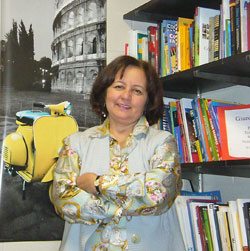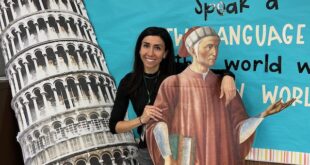
It’s a fitting motto for a remarkable woman who has taught Italian at Loyola University Chicago since 1987 — she started as a visiting lecturer sponsored by the Italian Ministry of Foreign Affairs. Readers may recall Ionta as Fra Noi’s Italian editor for three years; she also hosts immersion weekends and other activities at Casa Italia in Stone Park, Illinois, the home of Fra Noi.
“When in front of students, a teacher is like an open book,” Ionta says. “You can read every single letter written on each page.”
A native of Italy, Ionta is actually the daughter of an American mother born in New York. But her grandparents returned to Italy in 1958, giving Ionta the distinct advantage of growing up as an Italian native speaker.
Ionta recalls a time when her mom visited from Italy: “A lady asked us what language we were speaking. We answered it was Italian. She replied: ‘This is what I thought. It sounds so beautiful. Italian is the language of the angels.'”
Ionta, who teaches undergraduate students from beginner to advanced levels, earned her Laurea in Classical Studies from University of Rome La Sapienza and the DITALS Certification (Certificato in Didattica dell’Italiano a Stranieri) from the Università per Stranieri di Siena, Italy. She currently teaches around 150 students each academic year, and adults through private classes at her school, Azzurra, that she co-founded in 1998.
Whether leading Italian immersion days once a semester–where she might make and cook tagliatelle from scratch–or teaching a typical class session, Ionta seeks to help students learn, laugh, and fall in love with the language: “Last February, we celebrated Carnevale, decorating masks, learning about characters of Commedia dell’Arte and again, we ate typical Carnevale sweets. There also is an Italian Club. Sometimes, we watch Italian movies.”
She adds: ‘I approach every class with two objectives in my mind: caring for my students in order for them to learn about the Italian culture and language with joy; but also, caring as much as I can for their soul, their personality, their feelings about their study program as well as their own life.’ she says.
To illustrate, Ionta recalls a story of a student who became a teacher after graduating from Loyola University. “He said he liked my style of teaching, making everyone feel at ease and laugh while they learn. He also said he wanted to teach like me,” she recalls.
And so, this former student wrote her a note. It read: “I know you love your job and that love is carried within your class. Thank you for giving me, as well as all of us, the opportunity to accept that teaching present. It surely was a present filled with love when you taught us.”
“This,” Ionta notes, “was actually a present he gave me as a teacher and as a person.”
 Fra Noi Embrace Your Inner Italian
Fra Noi Embrace Your Inner Italian






